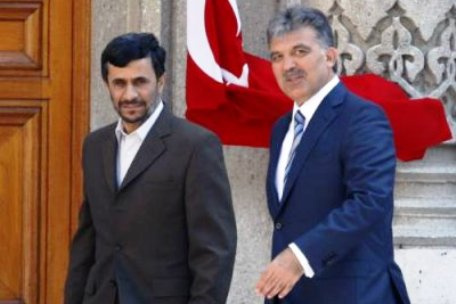Regional Developments and the Prospect of Iran-Turkey Relations

Relations between Tehran and Ankara are not as warm as they used to be. Turks may have downgraded ties with Israel following the UN report on the Mavi Marmara raid, but their approval for installation of NATO’s missile defense radar has vexed Iranians. Ankara’s policy against Syria, Iran's three-decade strategic ally, is not pleasant for the Iranian statesmen either. Iranian Diplomacy takes a look at the prospect of Tehran-Ankara relations in an interview with Hassan Beheshtipour:
IRD: How do you assess Iran-Turkey relations considering the ongoing developments in the Middle East?
HB: The relations have been warm during the recent years. However, as you mentioned, two major issues have recently affected Tehran-Ankara ties. The recent one was Turkey’s decision to host NATO’s missile defense radar. This is a direct threat against Iran's national security and has faced Tehran's reaction. It is against remarks expressed in 2010 by Prime Minister Recep Tayyip Erdogan and Foreign Minister Ahmet Davutoglu that Turkey’s soil will not be used as a platform to threaten the security of its neighbors. Ankara’s recent decision hints pressures from the US and other powerful NATO members. It is called a ‘defense’ shield, but it is an absolutely offensive mechanism. Although I think the shield’s key target is Russia, Iran as Turkey’s immediate neighbor has legitimate concerns about the plan
Turkey’s attitude towards the protests in Syria has also disappointed Iran. Ankara has concluded that Bashar Assad’s fall is imminent and it is apparently investing on the post-Assad era. The Turks have already established close ties with Assad’s opposition, especially the Syrian Muslim Brotherhood. Iran eyes Turkey’s policy carefully, since this concerns the fate of is long-time Arab ally. Syria is also serves as the front line of the Resistance against Israel and is critical in Iran's regional strategy. The future of Syria should be determined by Syrians, but this doesn’t deny Iran's right to be worried about the Resistance front or the possible rise of an Israel-friendly government in Damascus.
IRD: Ankara’s relations with Tel Aviv have remained strained following the UN report on Israel's on the Gaza aid flotilla. This may significantly influence Turkey’s status in the Muslim World. Could it also have any possible impact on Iran-Turkey relations or Iran's situation in the Muslim world?
HB: Turkey is well aware that the more distant it gets from Israel, the more will Iran be pleased. But it is obvious that Ankara’s policy is aimed to satisfy neither the Muslim World nor Iran, but its own national interests. Nine Turkish citizens were killed during the raid and the UN report sounded biased for the Turkish statesmen. Had Israel apologized, relations would return to a normal state. The tension between Ankara and Tel Aviv is a temporary phase. Military ties and strategic pacts will survive through this period.
IRD: How will the present difference between Iran and Turkey influence their relations in future?

